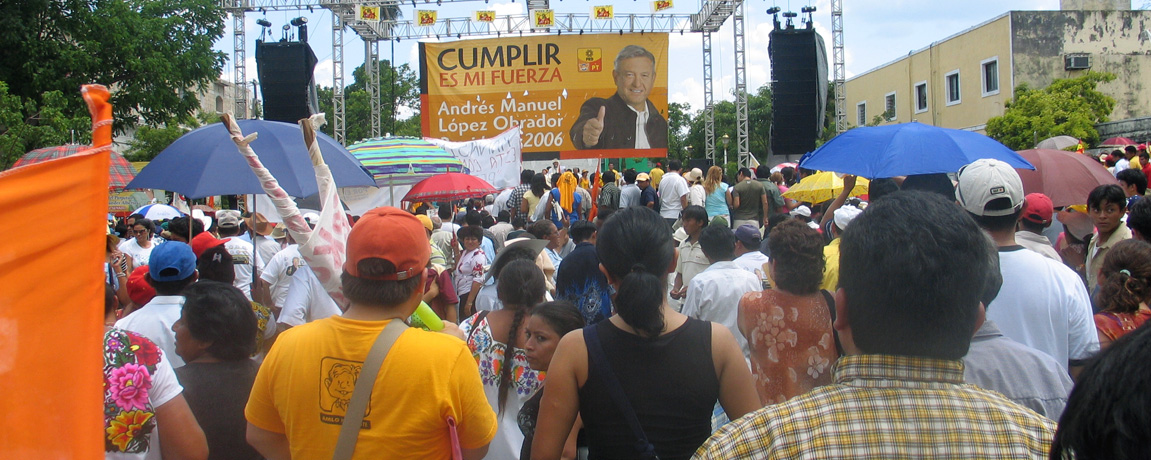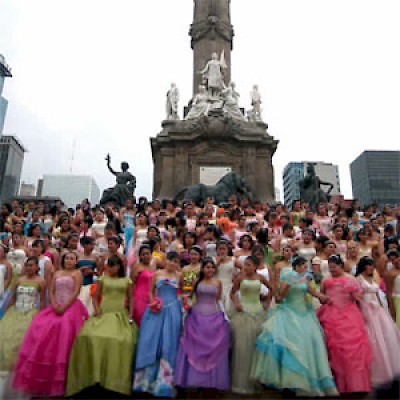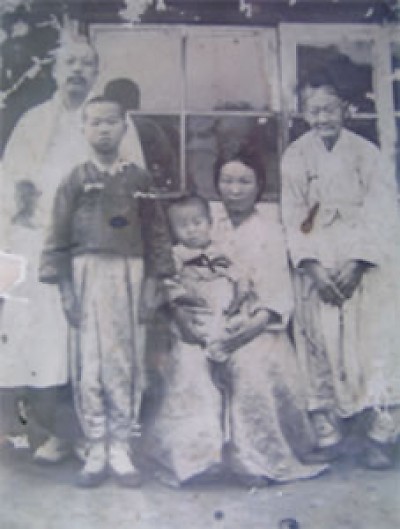Yucatan News: Flowers, Fire & Koreans
Notice: U.S. Citizens' Town Hall Meeting
The American Citizen Services Department of the U.S. Consulate in Merida will be holding a Town Hall Meeting on Thursday, May 8, 2008, at 10:00 AM at the Palacio de Gobierno (Governors Palace) in Progreso, Yucatan. With hurricane season on the horizon, the U.S. Consulate is teaming up with Yucatan state officials to use this meeting to bring Civil Defense and emergency preparedness information to American citizens. Consulate officials will provide tips on how to prepare for the upcoming hurricane season. In addition, Yucatan's Civil Protection agency will brief participants on potential emergencies, as well as on the local alert system used to communicate with the public. Tourism officials will be on hand to answer questions. American Citizen Services cordially invites everyone to attend and asks that this invitation be passed on to other American citizen residents and U.S. tourists. Yucatan Living will continue to bring you news of future Town Hall Meetings held by American Citizen Services. For this Town Hall Meeting, please RSVP: meridacons@state.gov
English Language Newspaper
The News is a daily Mexican newspaper, published in English in Mexico City. It was defunct for awhile, but began publishing again last October. It is sold at the newspaper stand that's just down from the door of the Olimpo. The paper's website requires a subscription, but does not deliver in Yucatan. Perhaps getting in touch with the paper's local contact will ensure an ample supply of papers, or even local delivery. He is: Manuel Fernando Magaña López (Calle 120A No. 357 x69 y 69 C. Fracc. Yucalpetén 97238).
Mark Bittman Defines Yucatan
We've never heard it said any better! Merida's own David Sterling, owner of Los Dos Cooking School, recently had a visitor - Mark Bittman, best selling cookbook writer and author of the "Minimalist," which runs weekly in the New York Times. Mr. Bittman defined Yucatan perfectly: "The Yucatán, which feels as Caribbean as it does Mexican, is to Mexico as Alsace is to France, as Sicily is to Italy, as Hawaii is to the United States: formally a part of the union, but culturally quite distinct, and with a well-preserved sense of identity."
If Mr. Bittman is that intuitive about our state, then his cookbooks must be spectacular! Order locally from Amate Books or order Mark Bittman's books here from Amazon (supports Yucatan Living).
Yucatecan Fusion Cuisine
Speaking of defining Yucatan, we also ran across a blog by another of David Sterling's visitors, Deborah Pankey, Food Editor at Chicago's Daily Herald. She has a great article about Yucateco food and cooking that includes recipes. In her article, the esteemed owner of Los Dos Cooking School is quoted as describing the food found in Yucatan as beginning with a Mayan platform and piled high with European "stuff." Ms Pankey notes that this is the definition of "fusion" and must mean that the food in our state should be renamed "fusion cuisine." We whole-heartedly agree!
Fiesta and Tulips in Holland, Michigan
In our Internet travels, while researching "Flowers For Sale" (at the end of this column), we ran across the lovely little city of Holland, Michigan. Holland is not only home to 6 million tulips, a huge Tulip Time Spring Festival and Working Gringa's aunt Myra, but it is also the home of Fiesta, one of the longest running events in Western Michigan. The two festivals take place at the same time so anyone in the area of Holland the first week in May is missing a grand time if they miss this double-dipper, 8 day event. In addition, Holland is home to Latin Americans United for Progress. Yucatan Living salutes Holland, Michigan, for its devotion to building a truly multicultural community.
Mexico's Answer to Paris and Nicole
We should have seen this one coming. If you have begun to believe that the word "Mexico" is actually defined as "richer, prettier, bigger, better, faster, more fashionable, and generally more-more-more," you are probably not far off the mark... and now Mexico is going to have its own answer to Paris Hilton and Nicole Richie. The reality show's name is "Glam Girls" and will star 4 wealthy socialites and 2 of their "less fortunate" friends. Just one more example of Mexico not only coming up on the outside fast, but passing everyone else at about 200 mph. The show starts in June and is going to be pay-per-view. We're just going to have to watch... at least once.
A Quinceanera for 300 in D.F.
A bit of cultural schizophrenia must be floating through the air in the offices of Yucatan Living. After lamenting the creation of "Glam Girls," we received an article about a quinceanera (15th birthday/coming out party) for 300 young ladies in Mexico City. Our immediate response was "How precious!" and "We need something like that here!" Then, we stopped to consider the issue. Do we really want our young ladies to grow up thinking of themselves as "princesses?" Like true Yucatecos, we want all of our boys and girls to feel as if the whole world is theirs and that all they have to do to claim it is study as much as they can and work as hard as they can. If they are willing to take the world we have left them and move it forward into the future, they should all have a quinceanera. It is a right of passage... the stuff of dreams - and they all deserve to have their dreams come true.
Two Colorado Girl Scouts Earn Gold Awards in Mexico
The Gold Award is the highest award in Girl Scouts. Two Evergreen, Colorado, young ladies have earned their Gold Awards with service to the people of Mexico. Kelly Drumright translated several pages of hearing aid-related documents from English to Spanish and interpreted for audiologists while on a medical mission trip to the Yucatan for the nonprofit organization "A Chance to Hear." Devon Swanson spent her Spring Break in Mexico, teaching English to 15 local children and helping to paint their library. We would like to congratulate both girls, their parents, and the community that produced them. We hope other Girl Scouts will want to come to our state and build even more relationships between the young people of the U.S. and Yucatan.
Butte County, CA, Firefighters Teach in Quintana Roo
American firefighters, many from Butte County, CA, just north of Sacramento, have come to the Mayan Riviera for the past seven years to train local firefighters. This year training concentrated on emergency medical services, heavy rescue/vehicle extrication techniques and fire apparatus maintenance and repair. The problem, say the American firefighters, is booming growth due to tourism, and an inability of smaller cities and towns to keep up with the needs created by such rapid growth. Some of the fire equipment in Quintana Roo has been donated by U.S. fire departments. Fire and the risk of fire are taken quite seriously in the State of Yucatan which, thankfully and due to weather patterns, has only a little more than half the risk of fire that is present in Quintana Roo. However, our risk for fire does still exist and is usually precipitated by out of control agricultural and/or trash burning. Toward protecting the citizens of Yucatan, there are more than 40 fire brigades located throughout the state.
>
The fire department in Yucatan asks that citizens please comply with the following rules in order to keep us all safe from the risk of fire:
- Do not throw lit cigarettes or matches on roads or in paths
- Use precaution when using matches, candles, fuel and fireworks
- When driving by a fire, please slow down and turn on your lights so others can see you through the smoke
- Do not throw bottles or glass objects on roads or in vacant lots
- Do not overload electrical outlets
- Please weed your land and courtyards
In addition, those involved in agriculture are asked to check with their nearest police station to find out when they can conduct agricultural burning, and are also asked to keep both their neighbors and the police informed as to when they have actually decided to conduct such burning.
The toll free numbers for reporting a fire are: 066 or 01-800-685-8989 or (from a cellphone) Send 118.
Ninos y Crias Bulletin and Camp
The new bulletin, just in from Ninos y Crias, is all about preventing forest fires this month. It also has an article about the Yucatecan Wren and, for the little ones, a precious page of wrens to color. You can print it here. For you older "kiddos" (at least 16 years of age), Ninos y Crias has a camp that might be of interest to you. They ask that you be able to devote at least 3 weeks to the camp. Activities will include keeping data on flamingos, banding flamingos, and reforestation. Activities are located in the Ria Largatos area. The overall program runs from the 15th of May until the 15th of October each year. More information can be found on the Ninos y Crias website (in Spanish).
Mexico Will Avoid Food Shortages
Global warming, the increasing demand for ethanol and who knows what else are causing food shortages around the world, as well as the violence that comes with starvation. Winters are too cold and summers are too hot. Rain is turning to floods and lack of rain to full-blown droughts. Using food crops to produce ethanol has already become catastrophic for the poor (see Ethanol Controversy). The Director of the United Nations World Food Program says this combination of factors is the equivalent of a "quiet tsunami" and has the potential to end in starvation of 100 million people around the world. The Mexican Government has announced that the yellow caution light is on in Mexico, but that they are taking steps in advance to ensure that it never turns to a red alert. Grain reserves are being increased and more resources than ever are being poured into rural agricultural development. What can we do to help? We can buy as much as we can directly from local producers so that our pesos go directly back into the support and development of our own agricultural sector. It isn't much, but its a start and we will try to find other ways for expats to help and bring those to you as well.
Bats, Birds, Caves, & Histoplasmosis
Did you know that there are a total of 55 different kinds of bats in the State of Yucatan? After long years of public education about how good bats are for the environment, many have forgotten that there is also a significant risk of contracting a very serious lung disease from inhaling air that contains the dust from large quantities of bat or bird droppings. In 2001, as Japanese researchers began exploring the caves in the southeastern part of our state, a researcher and her husband returned to Japan with acute pulmonary cave-associated histoplasmosis after spending three weeks in caves where bats roost. With the increase in tourism and eco-tourism certain to turn attention to caving in Yucatan, individuals new to this type of tourist experience should be careful to avoid caves where large numbers of bats or birds roost.
No Private Beaches in the State of Yucatan
This is the end of the story of what happens when someone tries to create a private beach in the State of Yucatan. According to reports, three years ago, a restaurant that sits virtually on a beach in the State of Yucatan decided to rope off the section of beach closest to it on cruise ship day. In the first place, all beaches in Mexico are public beaches and the path of the people is not to be hindered. In the second place, no matter what happens in other parts of the nation, the State of Yucatan will enforce all laws concerning its beaches. After three years of going through all of the proper channels, the people of Yucatan once again have an unhindered path along their own public beach - even on cruise ship day.
Korean Yucatecos: 100 Years of History
Did your ancestors come to the U.S. or Canada from somewhere else? Does that make you any less American or Canadian? Of course not, and the Koreans in Yucatan are as much Yucatecos as any other ethnic group here. In 1905, Korea's government was unstable and Yucatan's henequen plantation owners were working Mayans to death faster than their birth rate could replace them. A slave trader, disguised as a businessman, went to Korea and tricked 1,033 Koreans into thinking they would be working on sugar cane plantations in Hawaii. In fact, they ended up as slaves on henequen plantations in Yucatan. If such a thing is possible, they were treated even worse than the Mayans. In 1909, with the help of a Korean-American attorney, they won their freedom but could not go home because Korea had been taken over by Japan and they were refused entrance. There was no other place for them to go, so they stayed and continued to work for the haciendas under even worse conditions than before. During their captivity, a Methodist church in California sent them a Methodist Korean missionary, Whang Sa-Young, who rode his mule throughout the state and brought the Korean people hope for a better future. On May 9, 1909, Whang Sa-Young and another Methodist minister, Bang Hwa-Jung, helped the now free Koreans of Yucatan form their own chapter of the Korean National Association in Merida. Life has not been easy for Koreans in Yucatan because, as slaves, they began on the lowest rung of the social order. Many are still stuck in rural poverty, but others have made their way through all levels of Yucateco society and their names are now recognizable at the highest levels of the arts, business, and government. As Korean-Yucatecos begin a year-long celebration of their 100 years of history in this country, Yucatan Living would like to congratulate them on a job well done!
Flowers For Sale
The southern part of the State of Yucatan is home to many commercial horticulture and ornamental growers. However, there are also a number of housewives who raise flowers for sale at their homes.
These side businesses add to the income of the housewife-growers' families and gives us an opportunity to know that our pesos are going directly back into the economy of Yucatan. Here are just two of these talented ladies and their wares.
Producer: Clotilde Cano Quijano, Calle 33 x 46 y 48, Tzucacab
Available Plants:
lirios (Iris - variety unknown)
Orquideas Amarillas (Yellow)
Palmeras Kerpis (Adonidia Merrillii)
Tulipanes (Tulips)
Palmera Real
Ficus (variety unknown)
Adelfa (Oleander)
Cinta
Cica (Sago Palm)
Copa de Oro (Cup of Gold climbing vine)
Cuna de Moisés (great "filler" plant inside or out)
Narciso (Narcissus)
A variety of rosas (roses)
Dalias (perfect for a cut flower garden)
Flor de Noche Buena (Flower of Christmas Eve - Poinsettia)
Cola de Gallo (Rooster Tail, aka Bird of Paradise)
Galan de Noche (Gallant at Night, aka Night Blooming Jasmine)
Producer: Cristina Valladares Barbosa, Colonia San Víctor, Oxkutzcab - 3 km out of town on the short road between Oxkutzcab and Loltún. Plants are guaranteed.
Available Plants:
12 colors of Kalancho!
Despeinadas ("messed up hair" aka Mexican Ponytail Palm)
Galanteo (Gallantry) which opens in the morning and closes in the afternoon
Belén ("Bethlehem" aka Impatiens - in various colors, including a pink variegated - priced up to $50 pesos)
Cuna de Moisés (great "filler" plant inside or out)
Pino Dorado (Golden Pine - prices begin at $350 pesos)
Tulipanes (Tulips - Imperial and Japanese) {By the way - Did you know? Holland, Michigan celebrates both Latino and Dutch cultures: Fiesta! and the world-renown Tulip Time.}
Pluma del Indio (Plume of the Indian)
Groto (an orchid - usually blue)
Arboricola (Schefflera)
Violeta (African Violets - $80 pesos)
Helecho Japonés
Hoja del zopilote (large leaf mahogany), green plants used for shade, Japanese ferns,
and bougainvillea in all the colors
This grower also sells hoja del sapito(leaf frogs), salamandra (salamanders), and mariposa (butterflies).
When we first read about these two ladies in El Diario, we had to smile when one of them said "It was previously believed that only huaches (the local expression for people who moved here from Mexico City) would buy these kinds of ornamental plants." Over the course of the past five years, we have watched in amazement as all of Yucatan has come alive with gardening in every area of interest. We doubt that any population has ever embraced gardening as Yucatecos have. For those who are interested, there are quite a few garden clubs in Yucatan, including rose and orchid societies.













Comments
Nora 14 years ago
My grandparents were Koreans that were born in Merida Yucatan they were among thousands of Koreans that were deceived back during the Korean war...
Reply
Working Gringos 16 years ago
Thanks, Jim. You're absolutely right!
Reply
Jim 16 years ago
In the list of flowers and plants offered for sale from the ladies mentioned above, twice you list tulipanes as tulips. Actually tulipanes sold locally are what we know as hibiscus.
Reply
maria mutrux 16 years ago
I am pleased to find that there is a gardening comunity in the Yucatan. I will be moving to Tulum in the near future and am interested in finding out about the possibility of vegetable & herb gardening. I understand there are challenges! I would appreciate any information anyone could lend to the subject. My interest is culinary, and I would like to be able to do an organic, sustainable garden. Raised beds? Bat guano? Shade cloth? Can lettuce grow in this climate? Any luck with tomatoes? Any experience or information would be greatly appreciated.
Maria Mutrux
Reply
Lisa Williams 16 years ago
Hi,
I'd just like to know about the benefits that tourism has brought to Yucatan, in particular the Chichen Itza if possible? I'm writing two University papers on the issue and would be extremely grateful if someone from the actual Yucatan state could reply! I'm from the UK, so the chances of me finding anybody from Mexico here is very unlikely!
Many thanks,
Lisa Williams.
Reply
Khaki Scott 17 years ago
Shirley and Jose,
Yucatan currently has an Asociación de Descendientes Coreanos en Yucatán, KORYUC, A.C., as well as the Museo Conmemorativo de la Inmigración Coreana. They have a website here: http://www.mcicy.com/ complete with names, addresses, telephone numbers, and e-mail addresses here: http://www.mcicy.com/contac.html I hope that helps.
Reply
Shirley and Jose A Herrera 17 years ago
My wife and I believe this Korean-Yucatecos history should be brought to light to our highly successful California's Korean community. I am sure it would be to the advantage of Yucatan and Mexico. These Mexican, Yucateco-Korean descendants may perhaps receive financial help to go forth obtaining higher education within Yucatan, Mexico or elsewhere. We would like to "directly connect them" to Korean Church Groups here within our southern California Metropolitan areas. I have printed the information in "Cite as Warren Y. Kim, Koreans in America"- Please Comment!!
Reply
Yucatan Living - Yucatan News: Dolly and New Crater Museum 17 years ago
[...] and even the city itself. To read more about Korean-Yucatecos and how they came to Yucatan, read our news article celebrating the beginning of a year long celebration of 100 years of Korean history in this [...]
Reply
Louise Vogel 17 years ago
Holland, Michigan...
I never expected that name to appear in Yucatan Living...What a surprise!!
Would you believe that Herman Miller, the dutch company that originated in Zeeland and Holland Michigan in 1923; introduced their products to Merida in 1990? At that time, I was the company representative for the peninsula of Yucatan.
Reknown for their high quality classic contemporary furniture..designed by exceptional artists, the period's most outstanding designers: Gilbert Rohde, George Nelson, Charles and Ray Eames, Alexander Girard, and Isamu Noguchi.
herman Miller is still present here with a show room on Prolongacion Montejo at the traffic light intersection to Villas Hacienda.
Small World!!!
Reply
Khaki 17 years ago
Kelly - We don't want to eliminate our bats and birds. Without them, we would face even greater dangers from mosquitoes. The open air of our gardens does not place us at risk from anything our little flying critters are doing. The problem will only come when people begin to spend too much time in caves where there is a concentration of bat or bird droppings. With proper breathing filters and an understanding of safe cave exploration practices, our eco-tourists will be just fine.
Reply
Kelly Crost 17 years ago
The article about bats and birds brings up the issue of how deadly they can be to humans. This issue is often overlooked. People need to know how they can prevent themselves from these deadly diseases. So, where do we start? We start with the bats and birds. Bird-X, Inc is a 40-year-old company specializing in products that repel birds and or bats from designated areas. The article spoke about the high volume of tourists and how this has become a huge concern. Bird-X, Inc currently works with high tourist facilities such as Wrigley Field and Navy Pier in Chicago eliminating birds and ultimately preventing disease. Bird-X uses non-harmful taste aversions, visual deterents and audio repellents to create an undesirable environment. If you want more information about Bird-X, Inc you can visit www.bird-x.com or call 312-226-2473
Reply
(0 to 11 comments)Next »